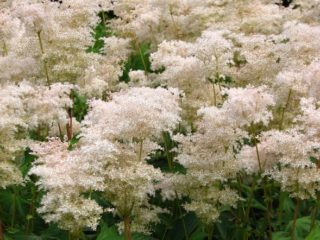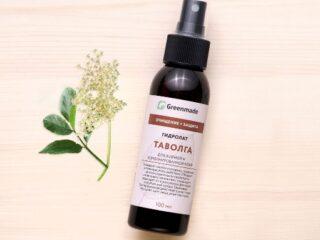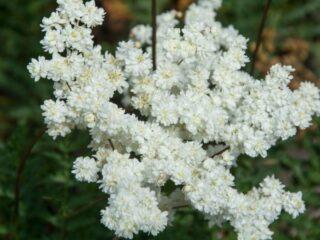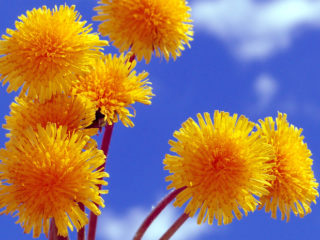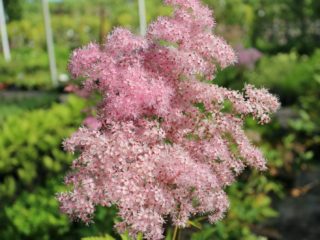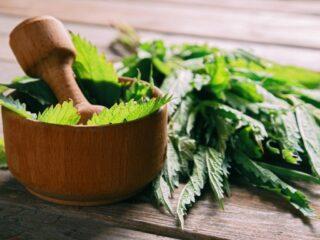Content
Meadowsweet or meadowsweet is a medicinal plant, which contains salicylic acid, which is part of aspirin. In the old days, among many peoples, it was considered a talisman against evil spirits and enemies. The plant has retained its relevance to this day, therefore it is widely used in folk medicine. If desired, meadowsweet can be grown on your site, since this culture has not only medicinal, but also high decorative qualities.
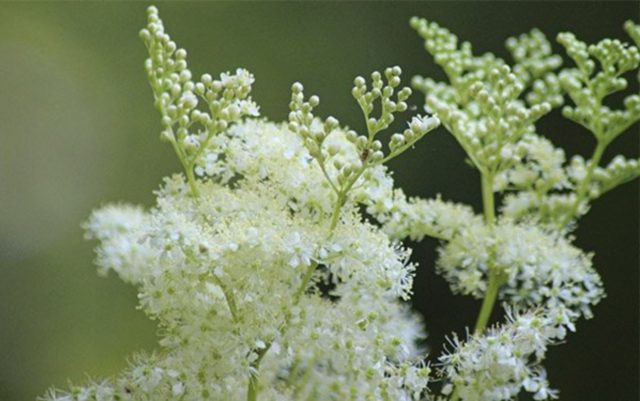
Common meadowsweet retains its decorative effect throughout the season.
What it looks like and where it grows
According to the description, common meadowsweet (photo below) is a perennial herbaceous shrub of a spreading type. The plant belongs to the Pink family. Under natural conditions, it grows in temperate zones of the Northern Hemisphere. Prefers moist soils, so it can be found on forest edges, meadows, glades and steppe slopes.
The height of the meadowsweet reaches 80 cm. Forms erect, ribbed shoots. In young branches, the surface is green, but as it matures, it acquires a reddish tint. The leaves are finely dissected, feathery, bright green in color. The length of the plates reaches 15-20 cm. They consist of separate 5-7 segments and are attached to a common petiole.
There is a slight serration along the edge of the plates. Leaves of common meadowsweet are mostly concentrated at the base of the plant and form a basal rosette. On the shoots, plates are less common, located opposite. The surface of the leaves is matte, with a slight hairiness on the reverse side.
Common meadowsweet has a long creeping root with spherical or fusiform nodules. The diameter of its growth is 50 cm. It is quite strong and branches well along the soil surface. Buds are formed on it, from which flowering shoots eventually grow.
In the second half of May, meadowsweet bloom. Her buds are simple, consisting of 6 petals, and in the center, when opened, you can see fluffy stamens. The shade is creamy white. Their diameter does not exceed 0.5-1.0 cm. They form paniculate apical inflorescences that confidently rise above the rosette of leaves. When opened, the buds exude a pleasant, unobtrusive aroma.
At the end of August, the common meadowsweet produces fruits. They are multi-nets. When ripe, it cracks, and seeds fall out of it.
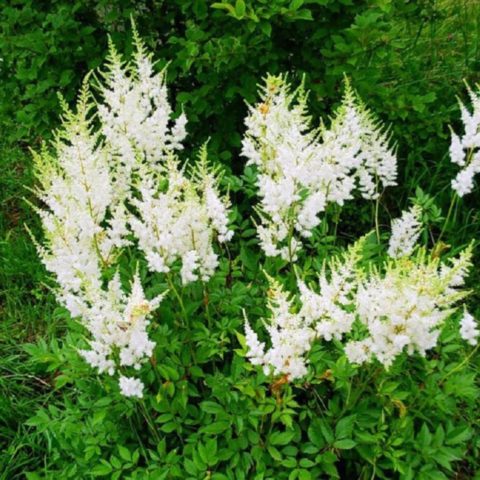
The flowering period of meadowsweet lasts a month
Chemical composition
The plant has a high content of useful components. At the same time, all parts of the meadowsweet have healing properties.
In the roots of the plant there is a glycoside gaulterin, a high concentration of starch, tannins and ascorbic acid.
The flowers of the plant contain:
- vitamin C;
- a whole complex of phenologlycosides;
- coumarins;
- flavonoids;
- tannins;
- methyl alcohol of salicylic acid;
- essential oil;
- tannins.
Leaves and shoots of meadowsweet are also valuable medicinal raw materials. They contain carotene, ascorbic acid, anthocyanins, flavonoids, tannins.
Medicinal properties of meadowsweet
Due to its rich chemical composition, the plant is used for medicinal purposes. The beneficial properties of meadowsweet help solve many health problems.
Folk remedies based on this plant have the following effects:
- diaphoretic:
- anti-inflammatory;
- astringent;
- diuretic;
- antibacterial;
- choleretic;
- fortifying;
- calming;
- antiscorbutic;
- pain reliever;
- antiseptic;
- bactericidal.
A wide spectrum of action makes it possible to use meadowsweet for the treatment of many diseases. The root has a beneficial effect on the work of internal organs and systems. It also helps relieve cramps and pain. Powder from the root when applied externally promotes wound healing, stops bleeding.
Flowers of meadowsweet are effective against worms. They are also recommended for use in renal failure, disorders of the genitourinary system. The astringent effect of inflorescences helps to normalize stool, improve bowel function.
Leaves and shoots of the plant help relieve tension, fatigue and stress. These parts are used to treat colds. Crushed powder based on them is used for burns and diaper rash.
The use of meadowsweet is justified for such diseases:
- diabetes;
- gout, rheumatism;
- thrombosis;
- hypertension;
- hemorrhoids;
- viral infections;
- gynecological diseases;
- pneumonia;
- bronchitis;
- polyp;
- anthony;
- heart diseases;
- psoriasis;
- herpes;
- inflammation of the sciatic nerve;
- intercostal neuralgia;
- epilepsy.
Cooking methods
Common meadowsweet can be used to prepare many medicinal products. But in order for them to be really effective, it is necessary to strictly adhere to all recommendations and observe the indicated dosage.
Tincture
This folk remedy is suitable for long-term storage, as it is prepared on the basis of vodka. To do this, add 15 g of crushed medicinal raw materials to 200 ml of the drink. Pour the mixture into a glass container and close the lid tightly. Withstand 3 days, shaking occasionally. Take 30 ml daily, morning and evening.
This remedy is recommended to be taken orally for diseases of the digestive system. And also externally for skin infectious pathologies, and as a rubbing for arthrosis and rheumatism.
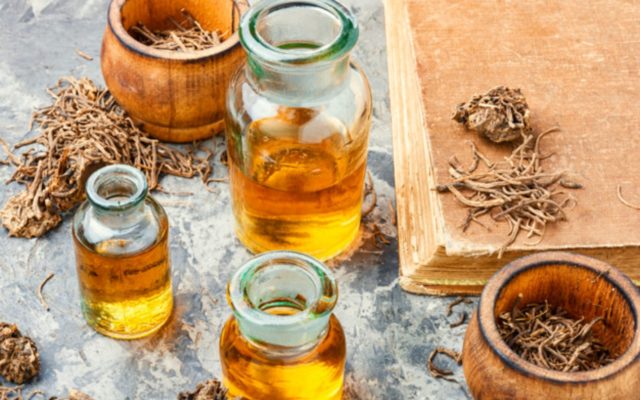
The tincture retains its medicinal qualities for 1 year.
Infusion
To prepare this remedy, add 1 tsp to 250 ml of boiling water. raw materials, cover with a lid. Withstand the infusion for 30 minutes, clean. With ARVI, take a drink inside 0.5 cups at night as a diaphoretic.
With diarrhea and severe swelling, drink an infusion of 100 ml twice a day. And also it can be used externally to treat herpes, psoriasis, abscesses.
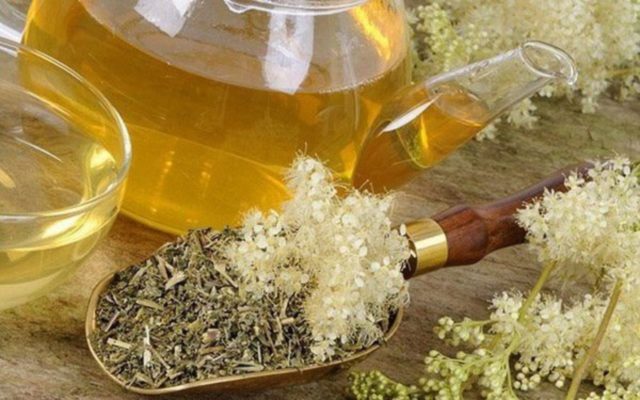
The infusion must be prepared immediately before use.
Decoction
To prepare this healing agent, it is necessary to pour 30 g of raw materials with 500 ml of water, mix. Boil the mixture for 20 minutes in a water bath, cool. Strain before use. Take 30 ml 2-3 times a day. The broth helps with hypertension, normalizes the water balance in the body and relieves puffiness.
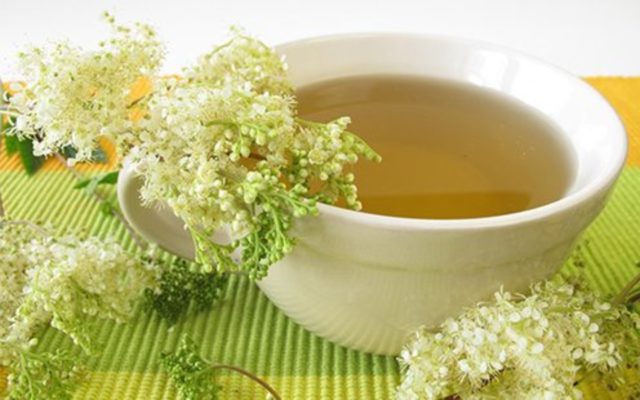
Store the broth for no more than 2 days in the refrigerator.
Tea
This drink is good for relieving fatigue, normalizing sleep and increasing stress resistance. To prepare it, you need 1 tsp. Pour 300 ml of boiling water over dried meadowsweet flowers, leave for 15 minutes. Drink tea 2 times a day, 100 ml.

You can add honey to the tea to improve the taste.
Ointment
This remedy is recommended for external use for the treatment of diseases such as psoriasis, herpes, burns. To prepare it, you must melt petroleum jelly, lanolin, or glycerin in a water bath. Add chopped leaves in powder form in a ratio of 2 to 3, mix. The product can be used when it cools down. Apply to problem areas of the skin 2 times a day.
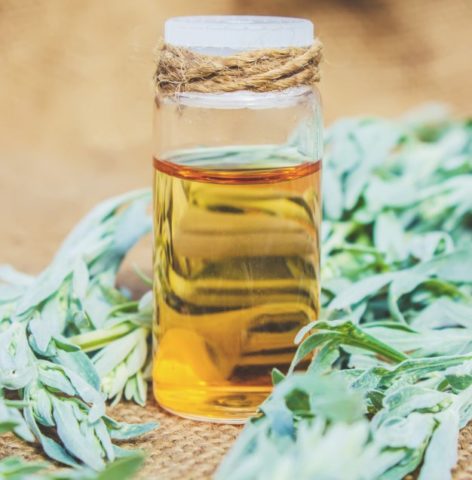
Cleanse the skin before applying the ointment.
Application in traditional medicine
Common meadowsweet is also used for directional means. They are effective for certain conditions. During their preparation, the dosage must be observed in order to avoid side effects.
Treatment of stomach ulcers with common meadowsweet
Pour 50 g of chopped leaves and shoots of meadowsweet into a glass container. Pour 600 ml of vodka and add 20 g of sugar, stir. Insist in the dark for 2 weeks, shaking the container occasionally. Cleanse and take before meals 3 times a day.
Against diarrhea
Pour 100 g of dried meadowsweet flowers with 400 ml of boiling water. Keep the resulting mixture in a thermos for 4 hours. Before use, clean from impurities. Drink 2 times a day until the unpleasant symptoms are completely eliminated.
For the treatment of kidney stones
To prepare a remedy, you need 2 tsp. Pour dried meadowsweet flowers into a thermos. Pour 250 ml of boiling water over them, close tightly with a lid. Withstand 4 hours. Reception is carried out 4 times a day before meals, 50 ml.
To normalize the hormonal background of women
Mix 1 tbsp. l. flowers of meadowsweet, linden, red clover. Pour into a thermos and pour 1 liter of boiling water. Leave for 2 hours. Strain before use. Take a drink twice a day, drinking 200 ml before meals.
For colds, to improve immunity
Pour 10 pieces into a saucepan. crushed inflorescences of meadowsweet, 12 tbsp. l. honey and pour 250 ml of water. Simmer the mixture in a water bath for 10 minutes after boiling. At the end of the preparation, filter the drink. Take 50 ml before meals, diluting with 200 ml of water.
Contraindications
Means based on meadowsweet have a healing effect. But they cannot be used during pregnancy and lactation, as well as for people with chronic constipation, low blood pressure, poor blood clotting.
Cultivation of six-petal meadowsweet from seeds and care
To grow this crop on the site, it is necessary to plant the seeds in late autumn so that they can undergo natural stratification in winter. To do this, you need to choose a shady place where moisture will not stagnate. Dig it up, add it to each square. m. 5 kg of humus and carefully level the surface. Make separate holes and plant meadowsweet seeds to a depth of 1-2 cm in moist soil.
In the spring, seedlings of the plant will appear, when they get stronger, they need to be planted at a distance of 30 cm. Growing meadowsweet will not cause much trouble to the gardener. Watering should be carried out only in the absence of rain for a long time. You need to feed the plant in autumn and spring with organic fertilizers.
The meadowsweet is able to grow in one place for 7 years. But to maintain its decorative effect, it is necessary to cut it regularly in spring and again at the end of summer. Subsequently, you can propagate by dividing the bush in spring and late summer.
When signs of powdery mildew or rust appear, the common meadowsweet should be treated twice with the preparation "Skor" or "Topaz". In case of aphid infestation by a spider mite, “Actellik” should be used.
Common meadowsweet can subsequently be planted on its own, therefore it is necessary to control this process and prevent the plant from spreading on the site.
Collection and procurement
It is necessary to collect medicinal raw materials at different times of the year, when useful components accumulate in certain parts. Leaves and shoots of meadowsweet need to be harvested during the summer. Flowers are recommended to be picked in May-June, and roots should be dug up in the fall.
The collected raw materials should be washed and dried in a dark place, excluding direct sunlight. The collection of meadowsweet should be stored in linen bags at low humidity in a glass container in the dark.
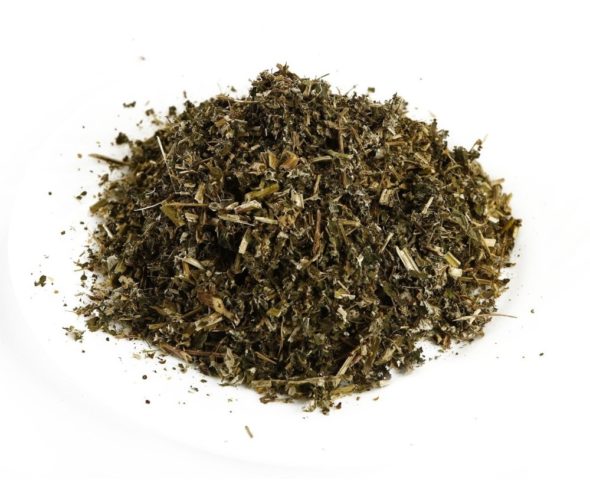
Shelf life of medicinal raw materials - 2 years
Conclusion
Common meadowsweet is a unique plant with a whole range of medicinal qualities. But in order for this culture to really bring health benefits, it is necessary to properly harvest the raw materials and subsequently store them. It is also important to adhere to all recommendations for the preparation of funds and take into account the existing contraindications. Otherwise, the common meadowsweet therapy will be not only useless, but also harmful to the body.
